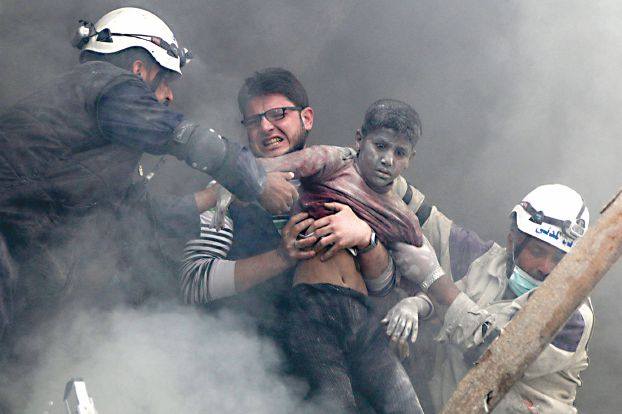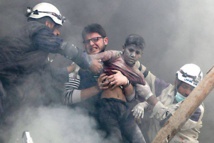Using satellite imagery, Human Rights Watch identified at least 450 damage sites in 10 towns and villages in the southern Daraa governate and over 1,000 in the northern city of Aleppo over the past year, which suggest widespread use of barrel bombs.
The rights group also examined dozens of videos uploaded on YouTube showing impact sites and Syrian Mi-17 helicopters dropping barrel bombs on civilian areas.
Human Rights Watch said an arms embargo would limit the Syrian regime's ability to carry out air attacks and deny it the possibility to purchase new helicopters or service its existing fleet.
Barrel bomb attacks have "made entire towns, entire neighborhoods unliveable and (are) a key cause of the displacement crisis," said Nadim Houry, the Middle East deputy director for Human Rights Watch.
"These attacks have continued in a climate of international indifference while all eyes have shifted on ISIS," the Islamic State group that now controls large parts of Syria, Houry told a news conference at UN headquarters.
More than 210,000 people have died in nearly four years of fighting in Syria and close to 12 million Syrians have been displaced including 3.8 million who have fled to Turkey, Jordan and Lebanon.
A year ago, the UN Security Council adopted a resolution calling on President Bashar al-Assad to end barrel bombing and other indiscriminate attacks.
The call for a tougher stance came as the United Nations is seeking to win Assad's support for a plan to suspend its air raids for six weeks in Aleppo to allow humanitarian aid to reach civilians.
Russia, Assad's ally, and China vetoed a resolution last year that would have allowed the International Criminal Court to investigate war crimes in Syria.
- Assad mocks barrel bomb claims -
In a BBC interview this month, Assad flatly denied that his forces were using barrel bombs, describing such claims as a "childish story."
"I haven't heard of (the) army using barrels, or maybe cooking pots," Assad said, laughing.
"We have bombs, missiles and bullets," he added, dismissing claims his forces were using indiscriminate weapons.
Human Rights Watch interviewed six doctors providing treatment to Syrian civilians in Jordan who said women and children make up two-thirds of the victims of attacks in late 2014.
In both Aleppo and Daraa, barrel bombs have hit residential areas including schools, mosques and markets as well as hospitals.
UN Secretary General Ban Ki-moon urged the Security Council in a report last week to take action to halt the use of barrel bombs in Syria as a matter of priority.
The report was the 12th to the council on the Syria crisis and was presented ahead of a meeting on Thursday on the humanitarian situation in the war-torn country.
--------------------------------------------------------------------------------------------------------------------
The rights group also examined dozens of videos uploaded on YouTube showing impact sites and Syrian Mi-17 helicopters dropping barrel bombs on civilian areas.
Human Rights Watch said an arms embargo would limit the Syrian regime's ability to carry out air attacks and deny it the possibility to purchase new helicopters or service its existing fleet.
Barrel bomb attacks have "made entire towns, entire neighborhoods unliveable and (are) a key cause of the displacement crisis," said Nadim Houry, the Middle East deputy director for Human Rights Watch.
"These attacks have continued in a climate of international indifference while all eyes have shifted on ISIS," the Islamic State group that now controls large parts of Syria, Houry told a news conference at UN headquarters.
More than 210,000 people have died in nearly four years of fighting in Syria and close to 12 million Syrians have been displaced including 3.8 million who have fled to Turkey, Jordan and Lebanon.
A year ago, the UN Security Council adopted a resolution calling on President Bashar al-Assad to end barrel bombing and other indiscriminate attacks.
The call for a tougher stance came as the United Nations is seeking to win Assad's support for a plan to suspend its air raids for six weeks in Aleppo to allow humanitarian aid to reach civilians.
Russia, Assad's ally, and China vetoed a resolution last year that would have allowed the International Criminal Court to investigate war crimes in Syria.
- Assad mocks barrel bomb claims -
In a BBC interview this month, Assad flatly denied that his forces were using barrel bombs, describing such claims as a "childish story."
"I haven't heard of (the) army using barrels, or maybe cooking pots," Assad said, laughing.
"We have bombs, missiles and bullets," he added, dismissing claims his forces were using indiscriminate weapons.
Human Rights Watch interviewed six doctors providing treatment to Syrian civilians in Jordan who said women and children make up two-thirds of the victims of attacks in late 2014.
In both Aleppo and Daraa, barrel bombs have hit residential areas including schools, mosques and markets as well as hospitals.
UN Secretary General Ban Ki-moon urged the Security Council in a report last week to take action to halt the use of barrel bombs in Syria as a matter of priority.
The report was the 12th to the council on the Syria crisis and was presented ahead of a meeting on Thursday on the humanitarian situation in the war-torn country.
--------------------------------------------------------------------------------------------------------------------









 Home
Home Politics
Politics











